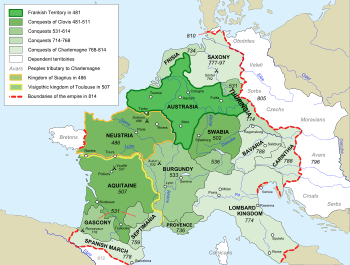481
| Millennium: | 1st millennium |
|---|---|
| Centuries: | 4th century · 5th century · 6th century |
| Decades: | 450s · 460s · 470s · 480s · 490s · 500s · 510s |
| Years: | 478 · 479 · 480 · 481 · 482 · 483 · 484 |
| 481 by topic | |
| Politics | |
| State leaders – Sovereign states | |
| Birth and death categories | |
| Births – Deaths | |
| Establishment and disestablishment categories | |
| Establishments – Disestablishments | |
| Gregorian calendar | 481 CDLXXXI |
| Ab urbe condita | 1234 |
| Assyrian calendar | 5231 |
| Bengali calendar | −112 |
| Berber calendar | 1431 |
| Buddhist calendar | 1025 |
| Burmese calendar | −157 |
| Byzantine calendar | 5989–5990 |
| Chinese calendar | 庚申年 (Metal Monkey) 3177 or 3117 — to — 辛酉年 (Metal Rooster) 3178 or 3118 |
| Coptic calendar | 197–198 |
| Discordian calendar | 1647 |
| Ethiopian calendar | 473–474 |
| Hebrew calendar | 4241–4242 |
| Hindu calendars | |
| - Vikram Samvat | 537–538 |
| - Shaka Samvat | 402–403 |
| - Kali Yuga | 3581–3582 |
| Holocene calendar | 10481 |
| Iranian calendar | 141 BP – 140 BP |
| Islamic calendar | 145 BH – 144 BH |
| Javanese calendar | 367–368 |
| Julian calendar | 481 CDLXXXI |
| Korean calendar | 2814 |
| Minguo calendar | 1431 before ROC 民前1431年 |
| Nanakshahi calendar | −987 |
| Seleucid era | 792/793 AG |
| Thai solar calendar | 1023–1024 |
| Wikimedia Commons has media related to 481. |

The Frankish Empire (481–814)
Year 481 (CDLXXXI) was a common year starting on Thursday (link will display the full calendar) of the Julian calendar. At the time, it was known as the Year of the Consulship of Maecius without colleague (or, less frequently, year 1234 Ab urbe condita). The denomination 481 for this year has been used since the early medieval period, when the Anno Domini calendar era became the prevalent method in Europe for naming years.
Events
By place
Europe
- King Childeric I dies at Tournai after a 24-year reign. He is succeeded by his 15-year-old son Clovis, who becomes ruler of the Salian Franks in the province Gallia Belgica (modern Belgium) until his death in 511.
- Theodoric Strabo defeats the Bulgars in Thrace, and moves with an army (13,000 men) towards Constantinople. After logistical problems, he is forced to return to Greece. In an encampment at Stabulum Diomedis, near Philippi, he falls from an unruly horse onto a spear and dies.
Persia
- The Armenians revolt against Persian rule, in an uprising that continues until 484. Led by Vahan Mamikonian, nephew of the late Vartan, they obtain religious and political freedom in return for military aid. Vahan is installed as governor (marzban).
Asia
Births
Deaths
- Childeric I, king of the Salian Franks (or 482)
- Sabinianus Magnus, Roman general
- Theodoric Strabo, Ostrogothic chieftain
- Timothy III, patriarch of Alexandria
References
This article is issued from Wikipedia - version of the 9/23/2016. The text is available under the Creative Commons Attribution/Share Alike but additional terms may apply for the media files.